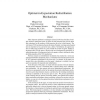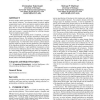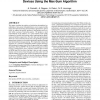133
click to vote
ATAL
2008
Springer
15 years 3 months ago
2008
Springer
When exploring a game over a large strategy space, it may not be feasible or cost-effective to evaluate the payoff of every relevant strategy profile. For example, determining a p...
ATAL
2008
Springer
15 years 3 months ago
2008
Springer
Many important problems in multiagent systems involve the allocation of multiple resources among the agents. If agents are self-interested, they will lie about their valuations fo...
111
click to vote
ATAL
2008
Springer
15 years 3 months ago
2008
Springer
Two currently active strands of research on logics for multi-agent systems are dynamic epistemic logic, focusing on the epistemic consequences of actions, and logics of coalitiona...
ATAL
2008
Springer
15 years 3 months ago
2008
Springer
In this paper we report results of an extensive evaluation of people's ability to reproduce the strategies they use in simple real-life settings. Having the ability to reliab...
100
click to vote
ATAL
2008
Springer
15 years 3 months ago
2008
Springer
Distributed constraint optimization problems (DCOPs) are a popular way of formulating and solving agent-coordination problems. It is often desirable to solve DCOPs optimally with m...
ATAL
2008
Springer
15 years 3 months ago
2008
Springer
Although normative systems, or social laws, have proved to be a highly influential approach to coordination in multi-agent systems, the issue of compliance to such normative syste...
ATAL
2008
Springer
15 years 3 months ago
2008
Springer
A spatial computer is a distributed multi-agent system that is embedded in a geometric space. A key challenge is engineering local agent interaction rules that enable spatial comp...
ATAL
2008
Springer
15 years 3 months ago
2008
Springer
In many complex multi-agent domains it is impractical to compute exact analytic solutions. An alternate means of analysis applies computational tools to derive and analyze empiric...
110
click to vote
ATAL
2008
Springer
15 years 3 months ago
2008
Springer
This paper considers the problem of performing decentralised coordination of low-power embedded devices (as is required within many environmental sensing and surveillance applicat...
111
click to vote
ATAL
2008
Springer
15 years 3 months ago
2008
Springer
Many multiagent domains where cooperation among agents is crucial to achieving a common goal can be modeled as coalitional games. However, in many of these domains, agents are une...




